7 May 1908, Chodorów – 23 November 1987, Nice
Biography
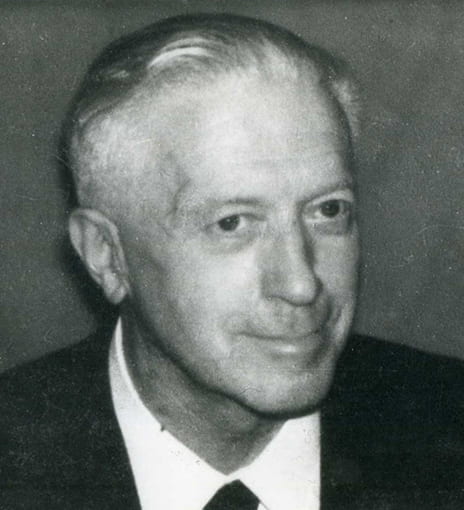
Young Life and Musical Studies
Józef Beer, a composer of many extremely popular stage works, was born in Chodorów (now Khodoriv, Ukraine) to a wealthy upper middle-class banking Polish-Jewish family and reared in Lwów (now Lviv, Ukraine). Interested in music since childhood, Beer attended high school in Lwów and simultaneously pursued his passion for composing by attending Lwów Conservatory and studying with pianist, composer, conductor, and musicologist, Vasyl Barvinsky (1888-1963).

Fulfilling his father’s request, Beer completed a year of law school in Lwów at the Jan Kazimierz University before applying for admission to the Hochschule für Musik in Vienna. In spite of very competitive exams and strict quotas for Polish and Jewish students, in 1927 Beer was accepted into the Masters’ level composition classes given by Joseph Marx (1882-1964), a renowned teacher and composer. As a result, with his father’s financial support, Beer was able to settle permanently in Vienna and graduated with the highest honors from the Hochschule on 30 June 1930.
Most of Beer’s youth compositions are lost to date, except for “Triptych” which was premiered in Poland by the Poznàn Philharmonic in 2019.
Beer’s first job in music was coaching choir and conducting the Rainer Simons ballet company that was headquartered in the Austrian capital, as well as touring Europe and the Middle East with this dance ensemble. Upon returning to Vienna, Beer met Fritz Löhner-Beda, the most prominent librettist of operettas in the German-speaking world. Deeply impressed with Beer’s talent, Löhner-Beda became not only his collaborator on future musical projects but also a mentor who introduced the young composer to Vienna’s musical elites.
Professional Life
The first Beer & Löhner-Beda project was the operetta Der Prinz von Schiras [The Prince of Shiraz], which received its world premiere at the Zurich Opera in 1934. It was an instant hit and the work was quickly staged in cities throughout Europe, including Vienna, Salzburg, Warsaw, Madrid, and Stockholm, and taken on tour of South America. Worldwide radio broadcasts of Der Prinz von Schiras further contributed to its great popularity. The 25-year old composer also received the highest praise from his former professor, Joseph Marx, who wrote to Beer that in his first work he “displayed a knowledge and mastery that well-established operetta composers do not possess.” Marx also noted that in his debut composition Beer created a new genre of a “symphonic Singspiel operetta.”
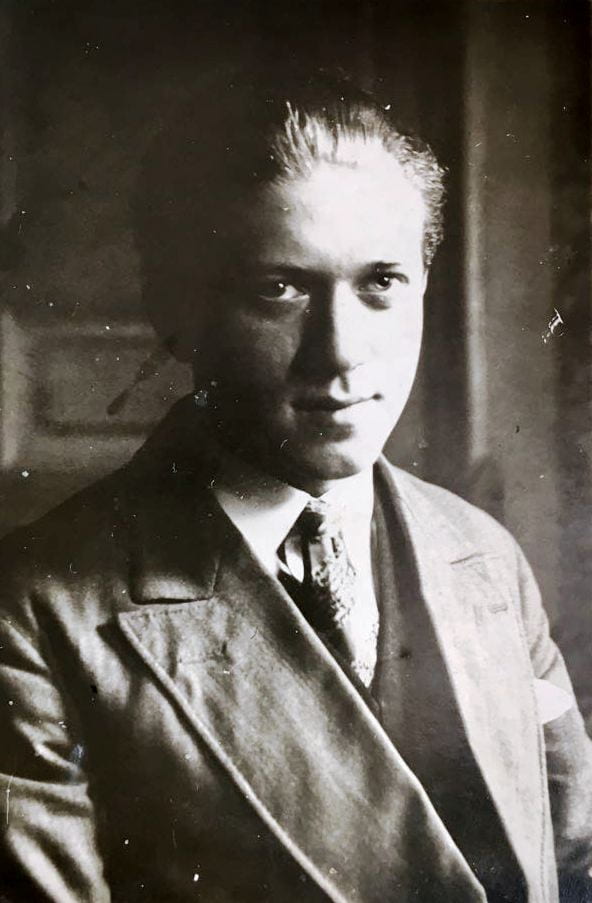
The next Joseph Beer project—with the libretto co-authored by Löhner-Beda and Alfred Grünwald—was the operetta, Polnische Hochzeit [The Polish Wedding]. It too won over the public and the critics after its world premiere at the Zurich Opera House in 1937. During the next two years, The Polish Wedding toured many major European stages and was translated into several foreign languages from the original German libretto. The Parisian premiere of the work at the Théâtre du Châtelet with the famous Polish tenor, Jan Kiepura and his wife, Marta Eggerth in lead roles had to be canceled due to the rapidly deteriorating political situation just before the outbreak of World War II.
The action of the Polnische Hochzeit takes place in 19th century Poland under foreign partitions.

The protagonist, Bolesław, is a young patriot and insurrectionist who has gone into hiding in Austria. Longing to rejoin Jadzia, the love of his life, Bolesław makes a risky return to Poland only to find
that his rich nobleman uncle, Count Zagórski, persuaded Jadzia’s less-well-off father, Baron Ogiński, to agree to their wedding. All kinds of complications ensue, accompanied by traditional Polish dances—including hearty mazurkas, stately polonaises, and dashing krakowiaks—written into the score in abundance.
The War Begins…
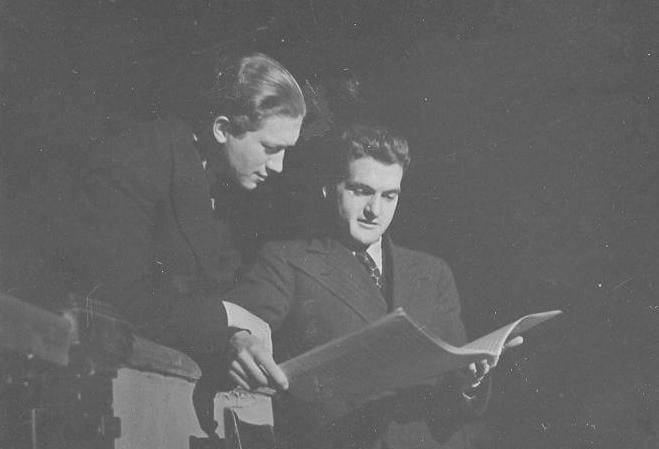
The Nazi Anschluss of Austria in 1938 and the ensuing ban on performances of all music by Jewish composers, including Beer, interrupted the planned staging of The Polish Wedding in other European capitals, as well as in New York. The 30-year old composer had to flee to Paris, where he worked mainly as an arranger and sent most of his earnings to help his family in the Lwów ghetto. Beer also tried to survive by accepting various commissions, including ghostwriting an operetta for a Zurich Opera conductor, Victor Reinshagen (1908-1992)—pictured above with Beer.
When Germans invaded Paris in 1940, Beer enlisted in the Polish Army-in-exile and unsuccessfully tried to reach England by boat from Bordeaux. Undaunted by this setback, Beer managed to escape to Nice, France, where he lived under an assumed name of Jean-Joseph Bérard. Fortunately, he was able to survive the war but his parents and sister perished in the concentration camps.
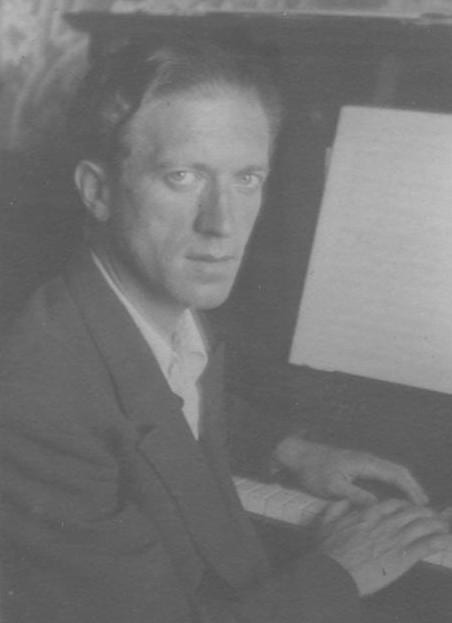
During the war years in Nice, Beer wrote another comic opera, Stradella in Venedig [Stradella in Venice], with the libretto based on the fascinating biography of an influential composer of the Italian Baroque,
Alessandro Stradella (1643-1682).Stradella’s dissolute and reckless life spent between Rome and Venice eventually led to his still unsolved murder in Genoa. Like his other two stage works, Beer’s Stradella was premiered at the Zurich Opera in 1949 and quickly hailed as a “comic opera of the highest sort.”
Life and Music Continue in France

Beer’s other big post-war opus—an oratorio Ave Maria for soloists, mixed choir and organ—was premiered in 1946 at the Notre-Dame Cathedral in Nice, where Beer continued to live after the war. There he met and married a German-Jewish refugee, Hanna Königsberg, in 1957. They had two daughters, Suzanne (an award-winning artist, philosopher and author residing in Paris), and Béatrice (an internationally acclaimed opera singer based in Philadelphia).
In subsequent years, Joseph Beer continued to pursue studying music and obtained a doctorate in musicology from the Sorbonne University in Paris in 1966. His thesis, L’Évolution du style harmonique dans l’œuvre de Scriàbine [The Evolution of Harmonic Style in the Work of Scriabin], was recognized with “Mention très honorable et felicitations de jury” and the famous French musicologist, Vladimir Jankélévitch, offered to publish it.
Musical Legacy
Until the end of his life and into the early 2000s, Beer’s pre-war opus—mainly The Polish Wedding—remained in the stage repertoire through various revivals. It was especially well regarded in Scandinavia, where the work was known under the title Masurkka, perhaps because the composer never gave his formal consent for its performances in northern Europe.
More recently, Austria’s second largest opera house in Graz produced a revival of The Polish Wedding in 2018-2019. Another staging of the work, this time in Linz, was awarded the Austrian Music Theatre Prize in 2019. Finally, in November 2020, a concert version of The Polish Wedding was heard at the ICE Congress Center in Kraków under the baton of the internationally acclaimed maestro Łukasz Borowicz. A German premiere of the work is currently planned for April 2021 in Dresden.
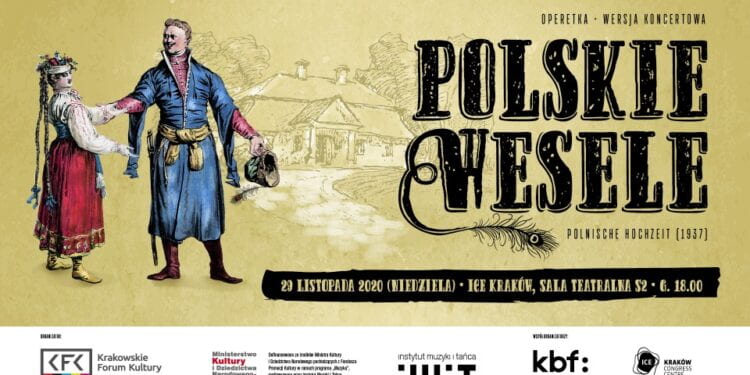
Joseph Beer’s lifelong passion for music survived undiminished in spite of many personal tragedies and the loss of his closest family during the war. According to his two daughters, he spent almost all of his time in their Nice apartment steadily composing at the piano. During the last decades of his life, Beer concentrated on completing two large-scale stage works, La Polonaise (1975) and Mitternachtssonne [Midnight Sun] (1987). As Singspiel operas, both of them espouse the genre that launched Beer’s career as a composer. La Polonaise is set in Poland during the Napoleonic era, while Mitternachtssonne is a supernatural romance tale set in Norway in the 1930s.

Joseph Beer died in Nice on 23 November 1987. In 2006, his widow, Hanna, and her two daughters launched the Joseph and Hanna Beer Foundation. Headquartered in Nice with offices in Paris and Philadelphia, the Foundation is dedicated to the promotion of Joseph Beer and his music. Thanks to their efforts—as well as those by Dr. Bret Werb at the U.S. Holocaust Museum, international Dramatic Baritone Robert McFarland and maestro Łukasz Borowicz, among others—numerous performances of Beer’s compositions have taken place across Europe during the past decade and, at long last, his doctoral thesis is scheduled to be published in France as well.
* * *
List Of Works:
Before 1934
Orchestration of Four Ballades, Op. 10 by Johannes Brahms [lost]
Atalia: Tango — (1927) [Phönix Verlag Wien]
Corelli-Variationen for clarinet and violin [lost]
Sonata for Cello and Clarinet [lost]
[Untitled] work for oboe and clarinet [lost]
Walzersilhouetten for orchestra [lost]
[Fünf] Lieder für Gesang und Klavier (Deine Augen sind wie Veilchen/Bussi/Was am Dach die Spatzen pfeifen/Du bist meine grosse Liebe/Katzenaugen). Texts by Fritz Löhner-Beda [Doblinger Musikverlag, Vienna]
Vor der Emigration—Sechs Schlager für Gesang und Klavier [Before the Emigration—6 Popular Songs for Voice and Piano]. Includes Herz und Herz [Heart and Heart] excerpted from Polnische Hochzeit. Texts by Fritz Löhner-Beda
Triptych for Symphonic Jazz Orchestra (Spiritual, Song, Dance), symphonic music [Universal]
After 1934
Der Prinz von Schiras Singspiel opera in 3 acts. Libretto by Fritz Löhner-Beda and Ludwig Herzer [Doremi Verlag; Ricordi Munich] — (1934)
Polnische Hochzeit Singspiel opera in 3 acts. Libretto by Fritz Löhner-Beda and Alfred Grünwald [Wiener Operetten Verlag; Doblinger Musikverlag, Vienna] — (1937)
Nadel und Zwirn Singspiel opera in 8 tableaux. Libretto by Paul Frank and Fritz Löhner-Beda [Doblinger Musikverlag, Vienna] — (1937)
Der geliebte Dieb Operetta in 3 acts. Libretto by Paul Frank and Fritz Löhner-Beda (ghostwritten by Joseph Beer for Victor Reinshagen) [Musikverlag und Bühnenvertrieb Zürich] — (1940)
Ave Maria Cantata for soloists, mixed choir and organ [lost] — (1946)
Stradella in Venedig Commedia dell’arte opera in 7 tableaux. Libretto by Joseph Beer [Doblinger Musikverlag, Vienna] — (1949)
Farandole Ballet music (excerpt from Stradella in Venedig) [Doblinger Musikverlag, Vienna] — (1949)
La Polonaise Singspiel opera in 3 acts. Libretto by Joseph Beer [unpublished manuscript] — (1977)
Mazurka Ballet music (excerpt from La Polonaise) — (1977)
Mitternachtssonne Singspiel opera in 5 tableaux. Libretto by Joseph Beer [unpublished manuscript] — (1987)
Links
www.facebook.com/JosephBeerComposer/
Joseph and Hanna Beer Foundation
Polish Operetta Premiere by Józef Beer
Page updated on January 2021